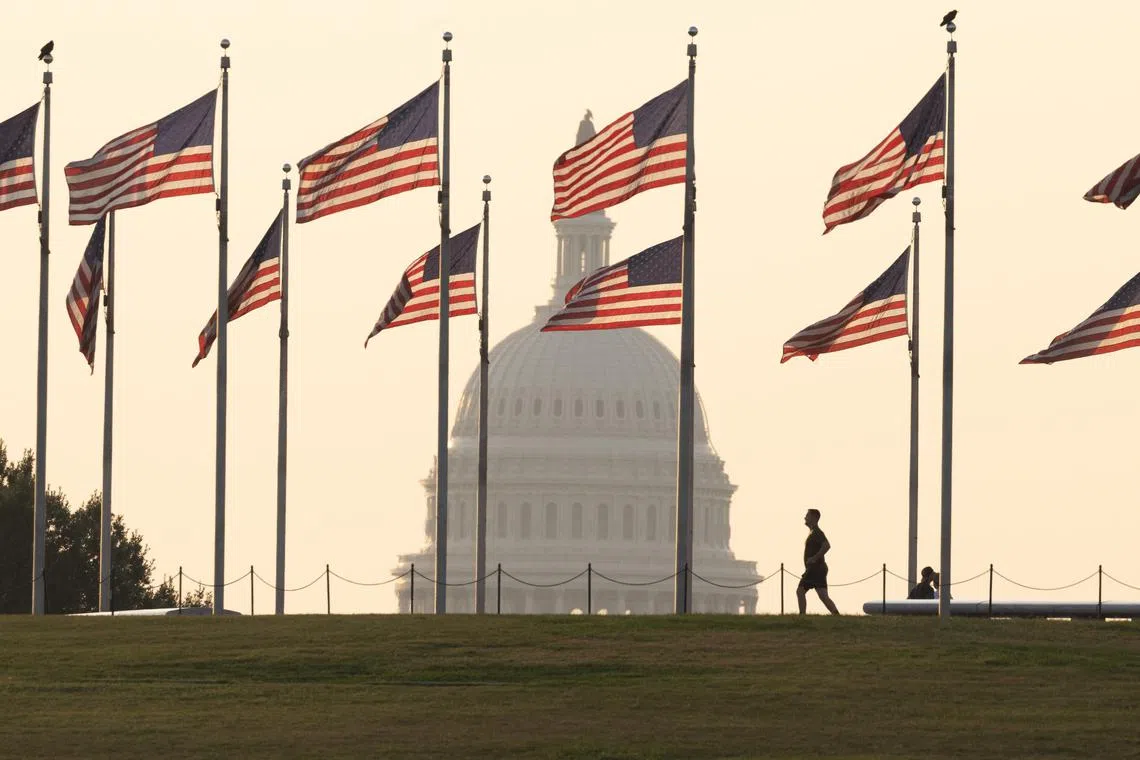MAS says a change in US policy direction after November polls would have global impact
Sign up now: Get ST's newsletters delivered to your inbox

Market participants worldwide are bracing themselves for dramatic policy changes if Donald Trump wins the US elections in November.
PHOTO: EPA-EFE
Follow topic:
SINGAPORE – With the increasing prospects of a second Trump presidency, both private investors and policymakers worldwide, including the Monetary Authority of Singapore (MAS), are putting the former US president’s policy prescriptions under focus.
MAS managing director Chia Der Jiun noted at a media conference on the central bank’s annual report on July 18: “What happens in the US, of course, is consequential to the world and consequential to the global economy.
“And, of course, what matters most of all is ultimately about the policies and measures and actions that are taken.”
He said if the US adopts policies that are pro-growth and do not add to inflationary impulses, they could be helpful to the global economy.
“If there is intensification and broadening of tariffs and trade restrictive measures, then this could negatively impact global growth and inflation,” added Mr Chia.
Donald Trump has floated a host of policy measures that he believes would help the US economy, including tax cuts and deregulation.
However, he has also proposed slapping 60 per cent tariffs on imports from China and 10 per cent duties on shipments from the rest of the world.
Analysts said the tariff hikes will spark retaliatory measures from other trading partners and carry the risk of raising global inflation.
Mr Chia said it is difficult at this point for MAS to know what awaits, adding: “We will have to wait and see whether they happen and how far they go.
“But clearly these are risks, and there is the potential for both positive policy measures coming out of the US as well as some measures that would negatively impact global growth and inflation. So, we will have to watch this space.”
Market participants worldwide are bracing themselves for dramatic policy changes if Trump wins the US presidential election in November.
Maybank Research senior economist Chua Hak Bin said that if the tariff hikes are implemented, they will increase the incentive for US companies to move their operations onshore and could dampen foreign direct investment to Asean.
“Trump has pledged to crack down on tariff evasion and trade diversion, which could result in collateral damage on Asean and discourage Chinese manufacturing investments in the region,” he said.
He noted that Vietnam may be more vulnerable as a third-country target, given its growing intermediate imports and investments from China, while Malaysia, Singapore and Thailand are at risk of collateral damage given their export dependence.
However, Mr Vasu Menon, managing director for investment strategy at OCBC Bank, said a Trump victory may not necessarily spell doom and gloom for financial markets.
“Interestingly, during Trump’s previous presidency between 2017 and 2020, the US stocks benchmark S&P 500 index rallied nearly 70 per cent.
“So, while geopolitics can be an important driver of markets, it is not the only driver,” he noted.
Still, many analysts believe a renewed trade war between the world’s two largest economies – the US and China – will be inflationary and may even force a new round of interest rate hikes by central banks that are already worried about inflation staying higher for longer.
The MAS annual report warned that the balance of risks appears to be tilted towards persistent inflation among most of Singapore’s trading partners.
“The pace of disinflation in Singapore’s major trading partners, especially in advanced economies, has slowed,” it noted.
“Further, geopolitical risks or extreme weather events could result in supply-driven cost hikes.”
In addition, a delayed and slower pace of monetary easing in advanced economies, such as the US and European Union, could trigger latent financial vulnerabilities and consequently weigh on growth, MAS said.
Mr Chia added: “Fresh geopolitical shocks could put upward pressure on imported costs, while a stronger-than-expected domestic labour market could lead to a re-acceleration in wage growth.
“Conversely, an unexpected weakening in the global economy could induce a greater easing of cost and price pressures.”


